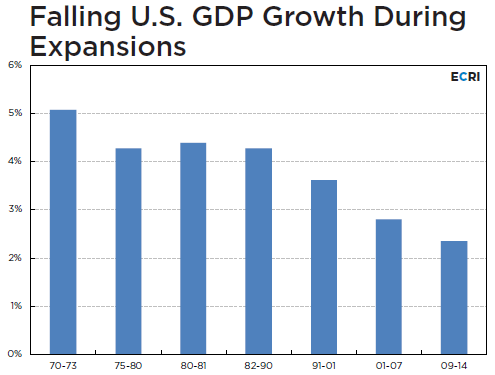Today's Market
by Dr Invest

In my last article, I alluded to consumer spending being down. This is because many corporations are only offering part-time jobs, which continue to be low-pay and circumvent the Obamacare ACA regulations. In the U.S. full-time employees must have their medical insurance paid by the corporation. (I know I'm being simplistic here, but there's not enough space to discuss ACA.) No one would argue that workers are being paid less, that inflation has been rising, that hidden taxes, fees, and medical insurance forced upon the U.S. populace has left families with less to spend at restaurants and stores. So consumer spending is down, affecting GDP and pulling down on economic recovery.
Empty stores from retailers that went out of business years ago -- such as Borders Group Inc., which had big floor plans that are hard to fill -- are dotting shopping centers across the country at a time the rest of the commercial real estate market has rebounded. They’re now going to be joined by thousands of additional stores that will soon be vacant as retailers such as RadioShack Corp. file for bankruptcy and department-store operators including J.C. Penney Co. and Macy’s Inc. cut locations to save money.
Vacancies at U.S. regional malls rose to 8 percent in the fourth quarter from 7.9 percent a year earlier, partly because of Sears Holdings Corp. store closures, according to Reis Inc. The real estate recovery for neighborhood and community shopping centers has “remained at a snail’s pace,” the New York-based research firm said in January.
Retailers and restaurateurs said last year they planned to close 5,483 locations, more than double the 2,592 in 2013, which was a record low, according to a report by the International Council of Shopping Centers and PNC Financial Services Group Inc. Last year’s total was the highest since 2010, according to the study.
Since then, retailers including apparel chains Wet Seal Inc. and Cache Inc. have filed for bankruptcy. Fort Worth, Texas-based RadioShack, with about 4,000 locations, sought protection from creditors on Feb. 5.
More troublesome for landlords than the relatively small Wet Seal and RadioShack locations are the spaces being abandoned by J.C. Penney and Macy’s. Replacement tenants will be difficult to find for those stores, with their large footprints. Macy’s Inc., based in Cincinnati, said in January that it will cut 14 of its approximately 790 Macy’s store locations within a few months. Plano, Texas-based J.C. Penney said it would close 40 stores around the U.S. this year.
Today's headline that unemployment has never been lower is admirable, but says little about the real condition of our economy. We may well see a dramatic recovery from yesterday's dramatic losses in the market, but the underlying economic sickness remains. Since 2012, when stimulus and bond buying began, our economy has been on life support. It is only a matter of time before economic conditions slip lower and a dreaded recession wipes away trillions in stock gains and the dreams of financial security.
by Dr Invest
Brian Louis recently wrote:
Vacancies at U.S. regional malls rose to 8 percent in the fourth quarter from 7.9 percent a year earlier, partly because of Sears Holdings Corp. store closures, according to Reis Inc. The real estate recovery for neighborhood and community shopping centers has “remained at a snail’s pace,” the New York-based research firm said in January.
Retailers and restaurateurs said last year they planned to close 5,483 locations, more than double the 2,592 in 2013, which was a record low, according to a report by the International Council of Shopping Centers and PNC Financial Services Group Inc. Last year’s total was the highest since 2010, according to the study.
Since then, retailers including apparel chains Wet Seal Inc. and Cache Inc. have filed for bankruptcy. Fort Worth, Texas-based RadioShack, with about 4,000 locations, sought protection from creditors on Feb. 5.
More troublesome for landlords than the relatively small Wet Seal and RadioShack locations are the spaces being abandoned by J.C. Penney and Macy’s. Replacement tenants will be difficult to find for those stores, with their large footprints. Macy’s Inc., based in Cincinnati, said in January that it will cut 14 of its approximately 790 Macy’s store locations within a few months. Plano, Texas-based J.C. Penney said it would close 40 stores around the U.S. this year.
Today's headline that unemployment has never been lower is admirable, but says little about the real condition of our economy. We may well see a dramatic recovery from yesterday's dramatic losses in the market, but the underlying economic sickness remains. Since 2012, when stimulus and bond buying began, our economy has been on life support. It is only a matter of time before economic conditions slip lower and a dreaded recession wipes away trillions in stock gains and the dreams of financial security.
(note: the above article is for entertainment purposes only and not to be used in anyway as financial advice.)
